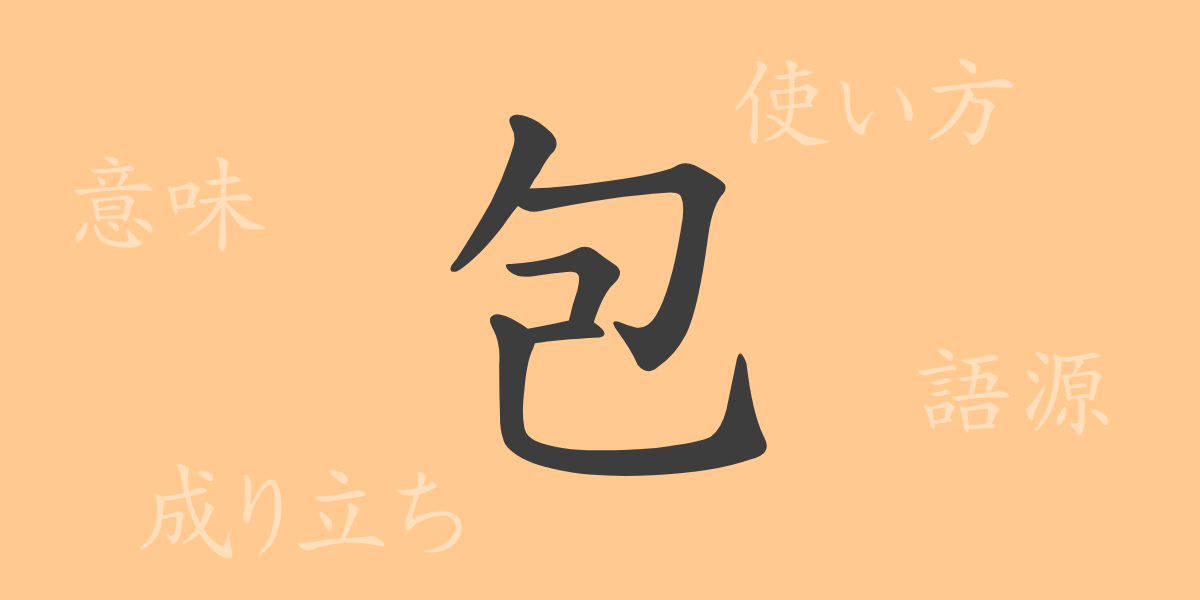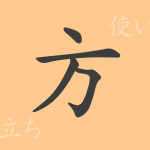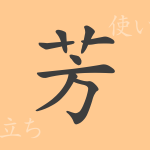Each character in the Japanese language has its own history, and every Kanji character used unconsciously in daily life carries deep meanings. The Kanji character “包” (ほう, hou) is no exception. In this article, we will comprehensively explain everything from the origin of “包” (ほう, hou) to its meaning, usage, and various idioms and proverbs. Let’s deepen your knowledge about “包” (ほう, hou), a familiar character in the commonly used Kanji in Japan.
Origin of 包 (ほう, hou)
The Kanji “包” (ほう, hou) is originally a pictograph meaning to wrap. It is said to represent the image of wrapping cloth in ancient China. The central part of the character indicates the object being wrapped, and the surrounding lines symbolize the hand movement of wrapping. Over time, this Kanji evolved and settled into its current form.
Meaning and Usage of 包 (ほう, hou)
“包” (ほう, hou) means “to wrap” or “to cover,” representing the concept of covering, protecting, or hiding something. In a broader sense, it also conveys the nuance of encompassing or embracing something. In terms of usage, it appears in words like “包装” (ほうそう, housou) and “包括” (ほうかつ, houkatsu), applying not only to physical meanings but also to abstract concepts.
Readings, Stroke Count, and Radical of 包 (ほう, hou)
The Kanji “包” (ほう, hou) has multiple readings, varying depending on the context in which it is used.
- Readings: On-yomi (音読み) is “ホウ” (ほう, hou), Kun-yomi (訓読み) is “つつむ” (つつむ, tsutsumu) and “くるむ” (くるむ, kurumu)
- Stroke Count: 5 strokes
- Radical: 勹 (つつみがまえ, tsutsumigamae)
Idioms, Proverbs, and Phrases Using 包 (ほう, hou) and Their Meanings
There are many idioms and proverbs that include “包” (ほう, hou), reflecting its basic meaning. Here are some examples:
- 包容力 (ほうようりょく, houyouryoku): The broad-mindedness to accept others’ opinions and actions.
- 一包の砂 (いっぽうのすな, ippou no suna): A metaphor for a very small amount.
- 包蔵 (ほうぞう, houzou): Keeping something in one’s heart.
- 包丁を入れる (ほうちょうをいれる, houchou wo ireru): Preparatory work before starting to cook, or an important initial procedure.
Summary of 包 (ほう, hou)
The Kanji “包” (ほう, hou), as its shape suggests, symbolizes the act of wrapping something. Frequently used in daily life, this character encompasses a wide range of meanings, from the physical act of wrapping to abstract concepts like the broad-mindedness represented by “包容力” (ほうようりょく, houyouryoku). By deepening your understanding of “包” (ほう, hou), you can expand the range of expressions with just a single choice of words, feeling the depth and richness of the Japanese language.

























